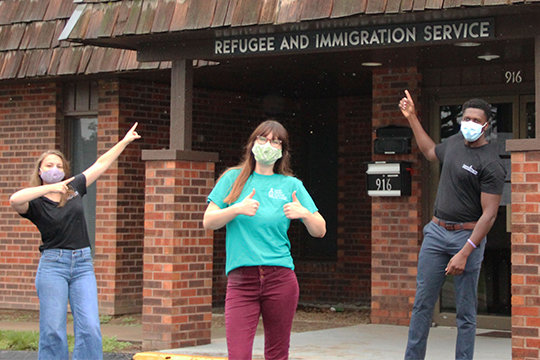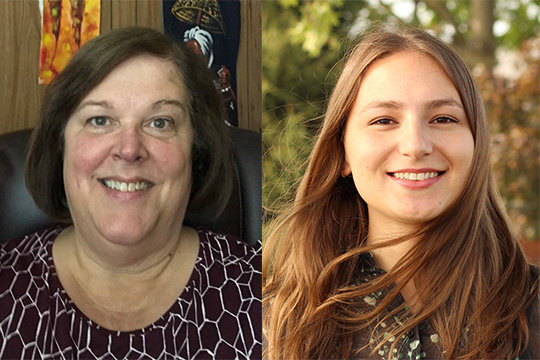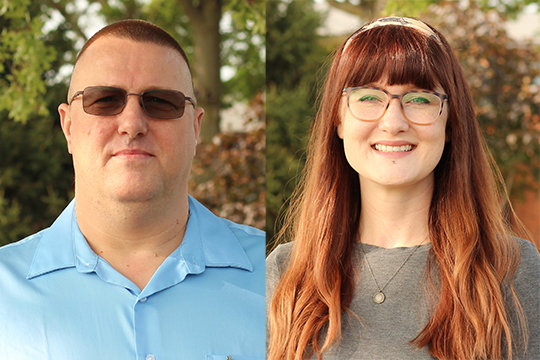Catholic Charities expanding refugee, immigration services
Samantha Moog is new director of Refugee Resettlement — Lorna Tran to continue directing Immigration Services

There will be no distinctions between native and foreign-born when the Lord returns in glory.
Until then, two divisions of Catholic Charities of Central and Northern Missouri (CCCNMO) must continue mediating such distinctions with charity and prudence.
“This is important for all of us because we as Catholics and all followers of Christ are called to welcome the stranger among us,” stated CCCNMO Executive Director Dan Lester.
He was speaking of the recent appointments of Samantha “Sam” Moog as the new director of the agency’s Refugee Resettlement Services (RRS) and of Lorna Tran to continue heading up the agency’s Immigration Services.
Both appointments took effect Dec. 1.
“Sam has a great passion for this work,” said Mr. Lester. “She has training in behavioral health and a background as a social worker. She has worked with refugee and migrant populations in the United States and abroad. She’s a community-builder and a great collaborator.”
He called Ms. Tran “a rock star.”
“Lorna’s dedication to help those who have fled war, religious or political persecution has been life-changing to those who walk through Catholic Charities’ doors,” he said.
Ms. Tran led both divisions for 13 years. In that time, the work of Refugee and Immigration Services has outgrown the capacity for one person to oversee properly.
“This division of programs will ensure that we maintain the highest bar of excellence in care for our clients,” said Mr. Lester.
Longtime Catholic Charities employees Senad Music and Grace Wildenhaus will serve as associate directors. They’ve been working there for 21 and three years, respectively.
Charity, mercy and justice
Catholic Charities (cccnmo.diojeffcity.org) is part of the U.S. Conference of Catholic Bishops’ (USCCB) Catholic resettlement network.
Formerly an office of the Jefferson City diocese, the resettlement program is the only agency in Central Missouri that resettles refugees, welcoming more than 4,000 over the past 45 years.
With a 13-member staff working in Columbia and Jefferson City, Catholic Charities’ resettlement program provides essential services to arriving refugees, especially in their first 90 days here.
All of these refugees, who leave their homes out of legitimate fear of death or serious injury, are thoroughly vetted for security through multiple federal departments, including the U.S. State Department.
Many previously lived in refugee camps for years. Most arrive here with little more than the clothes on their backs.
RRS-provided services, funded through government grants and through contributions to Catholic Charities, include: finding and helping to pay for suitable housing, used furniture, clothing and food; providing English-language instruction, driver’s training and employment strategies and placement; and offering interpreter services, health care facilitation, community information and referral, and extensive case management/counseling.
This is the division Ms. Moog will be leading.
Ms. Tran, one of three CCCNMO employees who are accredited by the U.S. Department of Justice to practice immigration law, will continue leading the agency’s Immigration Services.
This fee-based program helps people apply for changes to their immigrant status for about one-tenth of what it would cost for the same services elsewhere.
Both departments spend much of their energy reuniting and preserving families under U.S. law.
“Tremendous commitment”
Ms. Moog holds a bachelor’s degree in international and global studies from Middlebury College in Vermont and a master’s degree in social service administration, with a focus in international social welfare, from the University of Chicago.
She also holds a graduate certificate in grantsmanship from the University of Missouri Truman School of Public Affairs.
In addition to English, she is proficient in French and Arabic.
While in college, she volunteered with the Burmese refugee community in Burlington, Vermont.
“That’s what got my heart into the work,” she said.
At the same time, her studies shed light on many of the historical and ongoing causes of human migration crises throughout the world.
She said she was drawn to work for Catholic Charities by its “incredible history” and “tremendous commitment to helping refugees.”
She explained that every refugee approved for admission to the United States is sponsored by a resettlement agency, under a cooperative agreement with the U.S. State Department.
“The U.S. Conference of Catholic Bishops is one of the sponsoring refugee resettling agencies, and Catholic Charities of Central and Northern Missouri is one of its affiliates,” she said.
Volunteers of numerous faith backgrounds play a crucial role in welcoming refugees and providing services to them.
“We can’t do it without them,” she said.
“The need is great”
Ms. Tran had a college scholarship lined up 40 years ago when she accepted a summer job helping Alice Wolters in what was then the diocese’s Refugee Resettlement Services department.
“From that point, I was hooked,” she said.
Ms. Wolters, who led the Resettlement Office until 2004, became Ms. Tran’s mentor.
“She inspired me and taught me everything I knew,” said Ms. Tran, who became director of the department in March 2007.
She discovered that it’s more of a calling than a job.
“A lot of times, we’re just here to listen to people, because they have nowhere else to go,” she said.
On Ms. Tran’s watch, RRS grew from having three federal grants, six employees and a handful of volunteers, to having 12 federal grants, 14 employees and hundreds of volunteers.
At the same time, Immigration Services went from receiving fees totaling $47,335 in the 2006-07 fiscal year to more than $88,000 in the 2019-20 fiscal year — most in the form of $150 to $300 fees charged to clients.
It got to be too much of a good thing for one person to manage.
“I strongly feel that each program deserves a full-time director, one who can devote all of his or her time and energy to that one program,” she wrote to Mr. Lester earlier this year.
In large part due to the technical immigration law training and certification she spent many years acquiring and maintaining, she asked to remain director of Immigration Services.
Mr. Lester agreed with her position.
“So much of this is due to her amazing work,” he said. “She’s built up an incredible machine that does tremendous work and is largely unrecognized by the Mid-Missouri community.”
He conducted a national search for a new Refugee Resettlement director.
Ms. Tran will still do some work with refugees, helping with any of their immigration endeavors such as eventual permanent residency and citizenship, etc. But most of her energy will go toward helping keep families intact and solving immigration problems with careful attention to detail.
She said these are services that most people could not otherwise afford.
She’s deeply grateful to Suzanne Gladney, managing attorney for CCCNMO’s immigration services, for encouraging her, Mr. Music and Alice Loethen to pursue certification through the U.S. State Department.
“The need is great and never more than at this particular time,” Ms. Tran noted. “Immigration law is constantly changing, and we expect that to continue under a new administration.”
“Universal mission”
Ms. Moog said she can’t believe how fortunate she is to be working for an organization with such a distinguished history of helping refugees start a new life.
She plans to work out of the Catholic Charities office in Columbia most of the time and spend about a half-day per week in Jefferson City.
Although raised in the Jewish faith tradition, she fully respects the faith foundation and identity of Catholic Charities.
She believes the mission of refugee resettlement transcends creed and denomination.
“It’s a universal mission in terms of welcoming the stranger, the humanitarian aspects of this work and the dignity of every human being,” she said.
She said the Catholic Church’s vast deposit of social teachings, especially on human migration and the rights of refugees and migrants, is “really powerful.”
“The dignity of every human life, the right for people to pursue a better life for themselves, that migrants should be treated with dignity and should be able to make claims for asylum — these are things that resonate with me,” she said.
She noted that 79.5 million people in the world have been forcibly displaced, 26 million of whom are refugees with nowhere to go.
“That’s an incredible number of people whose lives are in limbo and who are waiting to be resettled,” she said.
“I think there’s a humanitarian call to action that needs to be responded to,” she added.
She noted that the U.S. government vets refugees more thoroughly than any other people who come to this country.
“They go through extensive interviews and background checks,” she said.
Evidence also shows that refugees who resettle in the United States contribute billions of dollars more in tax revenue each year than the cost of any benefits they received, she stated.
“Beautiful partnerships”
Mr. Lester pointed out that God’s command to help immigrants and refugees echoes throughout the Old and New Testaments, the teachings of the Church Fathers, numerous papal encyclicals and the Catechism of the Catholic Church.
It’s a point of agreement among a broad array of people of faith and goodwill.
“It crosses so many divides and helps create so many beautiful partnerships throughout society,” said Mr. Lester.
He doesn’t believe helping people who are already here and helping people who need to come here are mutually exclusive.
“I would ask the question: isn’t there a way we can do both?” he said. “We’re not talking about opening up our borders. But we are and always have been a nation of immigrants.
“I would argue that ultimately, if you look at the resources we could bring to bear to provide services for people, we have more than enough to go around to address the issues we have at home as well as welcome folks who are fleeing war, terror, violence and persecution in their own home,” he said.
He pointed out that less than 1 percent of refugees throughout the world ever resettle anywhere.
Of those, “a fraction of a fraction of a fraction” come to the United States,” he said.
“We do look upon people throughout the world, including those who are being persecuted for their religious beliefs, as our brothers and sisters,” he stated.
Ways to help
Ms. Moog pointed out that the presumptive incoming presidential administration will likely vastly increase the number of people who are eligible for refugee status in this country.
She noted that grants and contracts don’t cover all Catholic Charities costs of resettling people.
“We rely heavily on donations and our volunteers,” she said. “People can help by volunteering and by donating money, household goods and in-kind services.”
Through December, people can help Catholic Charities resettlement and immigration services by contributing online through the CoMoGives campaign at:
comogives.com/product/catholic-charities-refugee-and-immigration-services
Comments
Other items that may interest you
Services
The Catholic
Missourian
2207 W. Main St.
Jefferson City MO 65109-0914
(573) 635-9127
editor@diojeffcity.org








